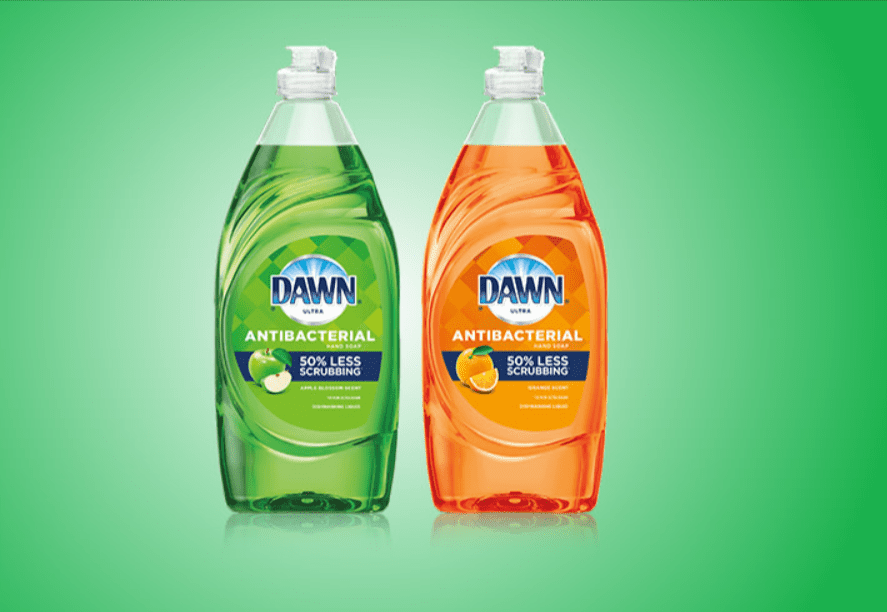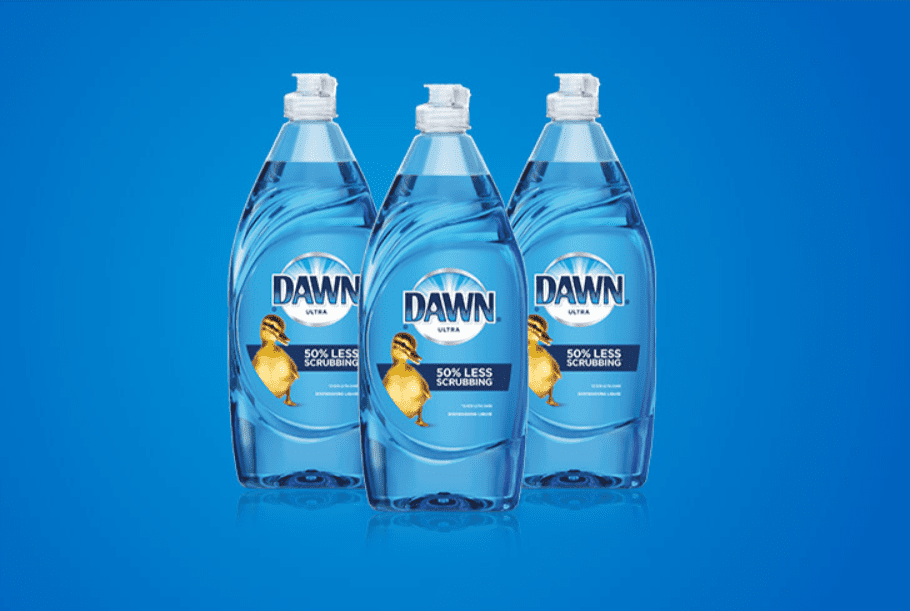Dawn dish soap is a household brand that’s revered not only because it has been around for a while but also for its effectiveness and affordability. It was introduced as far back as 1973 by Procter and Gamble and has served the dishwashing needs of American households since then.
Enhancing food flavor often requires some form of lubrication, and fats are integral for this purpose. In other words, dealing with grease in your dishes is almost inevitable, which is where Dawn dish soap comes in handy. This detergent acts as a surfactant, efficiently breaking down dirt and easing dish cleaning.
But then, that’s not the only area where it’s essential. You can even use Dawn dish soap to do your laundry, specifically to remove grease stains. It can also unclog your toilet, make your bathroom cleaner, and repel or kill insects in your garden.
In other words, there are many ways to use this product. But amidst all this versatility, several questions linger: Is Dawn dish soap biodegradable? What are the effects of Dawn Dish soap on the environment?
Well, read on for the answers!
What is Dawn Dish Soap?
Dawn Dish soap is a degreasing dishwashing liquid prevalent in American households. It has a strong grease-cleaning ability that ensures you consume less energy when doing the dishes manually or with your dishwasher.
Dawn Dish Soap is an American manufacturer of dishwashing soap. It is in liquid form, which makes it an excellent option for degreasing, doing laundry, repelling pests, opening clogged drains, and cleaning out carpet stains.
It even removes hair dye and excess grease, and you can use it to clean glass surfaces for extra sparkle. It comes in a portable container you can take with you anywhere, giving you access to its versatile nature on demand.
Like every other surfactant, Dawn dish soap is made from the saponification of fats and oil.
Is Dawn Soap Biodegradable?
Dawn soap is not entirely biodegradable. Precisely, Dawn dish soap is 90% biodegradable. That’s because 10% of its constituents are synthetic materials, specifically methylisothiazolinone and 1,4-dioxane. These materials do not break down, even though microbes will consume the other substances in no time.
It would be good news to proclaim that Dawn soap is 100% biodegradable. However, this popular household cleaning liquid soap is not entirely biodegradable.
Of course, it is excellent that some parts can break down seamlessly, but what about the other ingredients? They are not the best for the environment, biodegradability aside.
Triclosan is a pesticide that is found in Dawn dish soap. It is there in controlled amounts, but it exists to kill the bacteria and germs on your dishes and surfaces. It is an organic antibacterial and anti-fungi agent that is toxic to the environment. This is not an item that should be allowed to biodegrade in nature.
What is Dawn Dish Soap Made of?
Dawn Dish Soap has a long list of ingredients, but the most prominent ones include PPG 26, sodium lauryl sulfate, sodium laureth sulfate, sodium chloride, alcohol denatured, phenoxyethanol, methylisothiazolinone, blue #1, yellow #5, and lauramine oxide, among others.
Of course, that’s without forgetting Triclosan, responsible for killing bacteria and pathogens as already highlighted. This component is proclaimed for its antibacterial and anti-fungal properties, but it is also a toxic substance that can cause skin reactions and irritation. Another ingredient that can elicit this effect on biodiversity is methylisothiazolinone.
It is important to remember that Dawn Dish Soap is used to clean the dishes we eat. These things build up, even though the effects are not immediately prominent.
But again, there is hardly a difference between the Dawn Dish soap brand and other brands that manufacture cleaning agents. They all use similar ingredients that may not be great for you or the environment.

Is Dawn Soap Toxic?
Yes, Dawn Dish Soap is toxic because it contains harmful ingredients like Triclosan, 1,4-dioxane, synthetic dye, fragrance, and the dreaded methylisothiazolinone. These ingredients can cause mild to severe health conditions like nerve and liver damage, skin irritation, and allergic reactions.
Dawn soap is also toxic to wildlife, especially the aquatic community because it poisons the water. This liquid cleaning agent contains 1,4-dioxane, a substance renowned for polluting or contaminating the water.
The chemicals in Dawn dish soap can also affect aquatic life, disrupting the balance of their habitat. This can affect reproduction, respiration, feeding, and existence. It may also have adverse effects when it contacts a reactive or sensitive skin type.
Is Dawn Soap Environmentally Friendly?
Not entirely; some ingredients used to make Dawn Dish Soap are not environmentally friendly, even though the brand is supposed to be eco-friendly.
When Dawn Dish Soap water enters our water bodies, there is still a mild to high chance that it disrupts the balance of that habitat, poisoning the aquatic life in some cases.
Another harmful substance in Dawn Dish Soap is methylisothiazolinone, a biocide that has been mentioned briefly before, but let’s expand on it a little.
It is a preservative in cosmetics, cleaning agents, and self-care products. It exists to prevent the growth of bacteria, but this is a toxic substance known to cause allergies and skin irritation.
It is a contact allergen, so if it comes in direct contact with wildlife, it is a potential risk to the internal organs. There are other ways to kill germs, but methylisothiazolinone should not be on that list for the environment’s sake.
It is already receiving the required attention in jurisdictions prioritizing the environment’s safety.
Is Dawn Dish Soap Bad for the Soil?
One of the uses of dish soap is killing insecticides and other harmful pathogens in the soil. But is Dawn dish soap bad for the soil? Well, it depends on the quantity you use, even though it is best to opt for natural insecticides because they carry less risk.
Dawn dish soap is not bad for the soil when used reasonably. However, it is not exactly good either. This brand of dish soap may be biodegradable, but it contains some chemicals that don’t do well with the soil or microorganisms in it.
There is also dye in dish soap and fragrance, which are not necessarily great for the soil. Furthermore, some ingredients like methylisothiazolinone and 1,4-dioxane are found in Dawn dish soap.
Methylisothiazolinone is a biocide, killing less potent organisms that come in contact with it. Therefore, when it gets into the ecosystem, especially undiluted, it tends to leave some undesirable impacts.
Furthermore, it contains fragrances and colorants which don’t do well with the soil. Dawn Dish Soap is loaded with many unnatural ingredients that can affect the pH balance or acidity of the soil, and that is if it doesn’t kill harmless and harmful microorganisms first.
Although Dawn Dish Soap is a better alternative than the more chemically potent insecticides and pesticides, it still has some detrimental effects on the soil.
You may, however, be able to reduce the potency by diluting it with vinegar before application.
Is Dawn Bad for the Environment?
Yes, Dawn dish soap contains some bad ingredients for the environment. As much as we hate to burst the bubble, the nonbiodegradable substances in Dawn dish soap can harm biodiversity and poison our water bodies, which is what they do!
A biocide called methylisothiazolinone or MI is present in Dawn dish soap. It is a synthetic chemical preservative that also kills bacteria and other harmful pathogens on your bowls, clothes, hair, or whatever you use this liquid to wash.
Uses of Dawn Dish Soap
There is an almost endless list of the uses of Dawn dish soap. But let’s consider these favorites:
1. Degreasing
This is the most important and everyday use for Dawn dish soap. It is an excellent degreaser that removes grease from glass and clothing surfaces, porcelain, plastic, and laundry. You can even use it to reduce grease on a baby’s diapers.
Dawn dish soap contains active ingredients that act on the greasy molecules, taking them out without remorse.
2. Protecting Houseplants
There is a reason Dawn dish soap is popular in households with gardens. Typically, you can dilute dish soap with vinegar to reduce the presence of pests that bug houseplants, but Dawn dish soap is an even better alternative.
You can also use it to prepare the soil for a new planting season, even though you only need a small quantity to avoid killing the helpful microorganisms.
Although this isn’t the most commendable thing, Dawn dish soap contains methylisothiazolinone, a biocide that you can use to your advantage.
Mix some with vinegar and spray it around plants and the parts of the soil that need it.
3. De-clogging Toilets
Dawn dish soap is also a great toilet cleaner. You can also use it to unclog toilets. Just pour enough into the toilet bowl and leave it to set for about half an hour. Unclogging will become more manageable, and the water will flow easily afterwards.
4. DIY Painting Projects
DIY or craft sessions are fantastic and therapeutic, but cleaning up afterwards is a chore, especially when removing paint from our bodies. Dawn dish soap comes to the rescue once again – you can rub some on your body before your painting task, and when paint splatters all over you, cleaning it off will be a matter of taking a shower.
5. Hair Maintenance
Tired of greasy hair? Do you have some permanent dye in your hair? Want better hair conditions?
You can use Dawn dish soap to remove hair dye and reduce greasy hair conditions. Don’t forget to use conditioner after!
Conclusion
It is becoming increasingly essential for us to regulate our consumer behaviors and produce materials that don’t support the ecosystem. At the fore of our negative production impacts is the pollution of ocean bodies.
This spells doom if we don’t take active corrective steps fast, and one way to get started is to avoid toxic cleaning materials. Fats and oils are the most important ingredients for making soap and are already biodegradable.
We believe our industry titans have the resources and brainpower to develop more environmentally friendly cleaning agents, and we urge them to do it without further delay!






